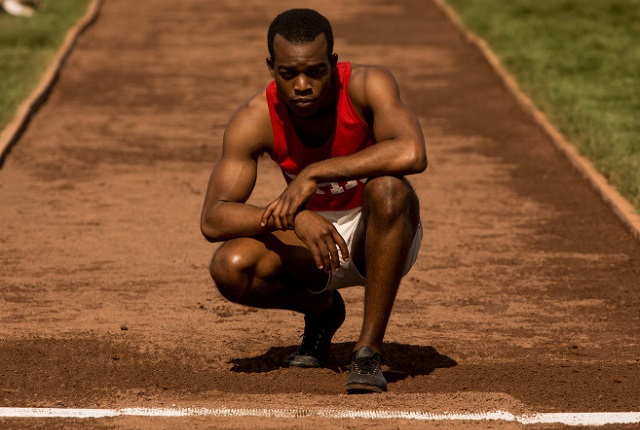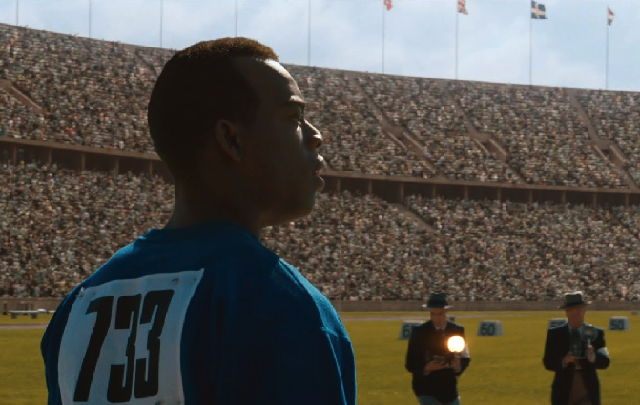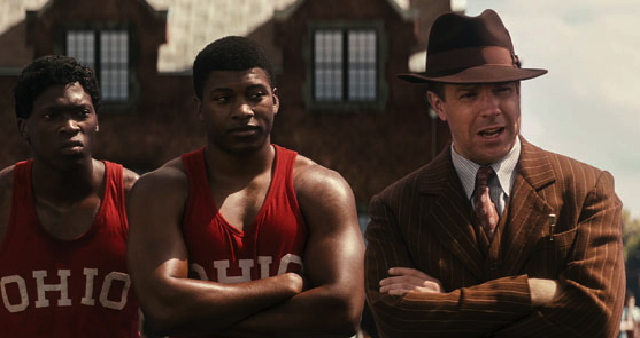Perhaps the most amazing thing about Race is that it’s the first feature film made about legendary track star Jesse Owens. (There was a 1984 TV movie, titled The Jesse Owens Story, starring Dorian Harewood as the four-time Olympic gold medalist.)
But maybe modern movie technology had to catch up to Owens’ story, especially with digital effects recreating 1936 Berlin and its Olympic Stadium. Hollywood is apparently trying to make up for lost time with three different movies in various forms of development. Disney has a project based on Jeremy Schaap’s book Triumph, while Anthony Mackie is attached to another Owens biopic. But Race is the first to break the tape and sets a standard that will be intriguing to compare to those other two films if they ever get made.
Directed by Stephen Hopkins (Lost in Space), Race focuses on the three-year period leading up to Owens competing at the 1936 Olympics in Berlin. That’s typically been the smarter way to go for biopics in recent years (such as the Jackie Robinson film 42), concentrating on a particular span of time, rather than attempt to tell a person’s entire life story in two hours. The story begins as Owens (played by Stephan James, who portrayed John Lewis in Selma) leaves for Ohio State, the first in his family to attend college. It’s quickly and efficiently established that Owens was raised by a tough, quiet father and is raising a young girl with his girlfriend, who’s staying behind in Cleveland.
https://youtu.be/E31LnSw47xo
Ian at the Movies
- Borg vs. McEnroe is surprisingly good, portraying two tennis icons not as different as believed
- Rampage works because it doesn’t try to adapt the video game
- Why Tomb Raider and Alicia Vikander break the bad video game movie trend
- Game Night uses all its pieces well, notably Rachel McAdams, for a twisty story full of laughs
- Black Panther is like no other Marvel film, reaching a higher bar as a result: 5 takeaways
Coaching Owens to gold medal glory would also be a vicarious triumph for Snyder, an accomplished track and field star that had his Olympic ambitions dashed when a plane accident cost him a chance to compete. That lends a layer of sentimentality to his character, which is a bit of a sappy note. Yet it also adds to the significance of Snyder fighting so hard to join Owens in Berlin. Yes, he wants to coach his star and knows that Olympic (and USC) head coach Dean Cromwell’s uncompromising style and racist leanings won’t get the best out of Owens. But Snyder also wants to be in the environment he never got to enjoy as an athlete.
The story is much bigger than Owens and Snyder, of course. Berlin is under Nazi rule and the reign of Hitler. Hosting the Olympics is supposed to demonstrate Aryan supremacy to the rest of the world, and Joseph Goebbels (Barnaby Metschurat) fully intends to carry out his Führer’s vision and record this display of superiority for posterity, hiring Leni Riefenstahl (Carice van Houten) to make what history has taught us will become an infamous and legendary film, viewed largely as Nazi propaganda.
While Owens becomes nationally celebrated for his achievements — including setting three world records in the span of 45 minutes during the 1935 Big Ten track meet at the University of Michigan (Ferry Field is recreated faithfully via CGI) — the U.S. Olympic committee is mulling over whether or not to boycott the Berlin Games because of the Nazi persecution of Jews. If Nazi Germany won’t allow Jewish and Black people to compete in the Olympics, a contingent of the committee— led by AAU president Jeremiah Mahoney (William Hurt) — feels the United States has to pull out.
One dissenting voice is Avery Brundage (Jeremy Irons), who feels it’s important for the U.S. to show that international politics have no role in Olympic competition. Mahoney and the USOC decide to dispatch Brundage to Berlin and convince the Nazi regime that Jews and Blacks must participate to convince the world that Germany is a deserving host for the Olympics. Brundage also wanted it made clear that the U.S. competing in Berlin was in no way an endorsement of the Nazi regime. (Later on, Brundage has to make a deal with Goebbels to meet the United States’ conditions, one which costs the team’s Jewish athletes an opportunity to compete.)
Additionally, Owens faces pressure from the Black community (notably the NAACP) to boycott the Olympics because of Nazi Germany’s racial persecution. What sends a better message: To reject what Berlin represents or to face the Nazis on their own turf, and own terms, and show them that their oppressive regime won’t win?
All of this is a lot of material for a two-hour movie to cover suitably. Hopkins, and the script by Joe Shrapnel and Anna Waterhouse, does a decent job of giving every storyline proper attention. Brundage’s dealings with Goebbels and Riefenstahl’s filmmaking absolutely have to be part of this story to serve history properly. But Race isn’t nearly as compelling when it’s not following Owens and Snyder. (Owens’ relationship with his future wife is also a major component of the story, but is a rather standard romantic storyline.)
Sudeikis does good work in his first dramatic role, which may have been the biggest concern about this film going in. His smirking arrogance fits a coach who defies traditional training methods and deep racism on campus (especially from the Ohio State football team), while also able to push Owens to fulfilling his potential as an athlete and cultural icon. And when the script calls for him to be poignant, Sudeikis hits the right notes.
As Owens, James is a compelling star capable of carrying the film. If he falls short in any scenes (notably the love story), it’s because the script lets him down with mediocre dialogue. But when James has to portray Owens rising to the occasion, whether athletically or culturally (a subplot involving him and German track star Luz Long is one of the warmest parts of the story), he lifts the movie with him. Hopefully, this role is the same sort of springboard for James that Jackie Robinson was for Chadwick Boseman.










Comments are closed.